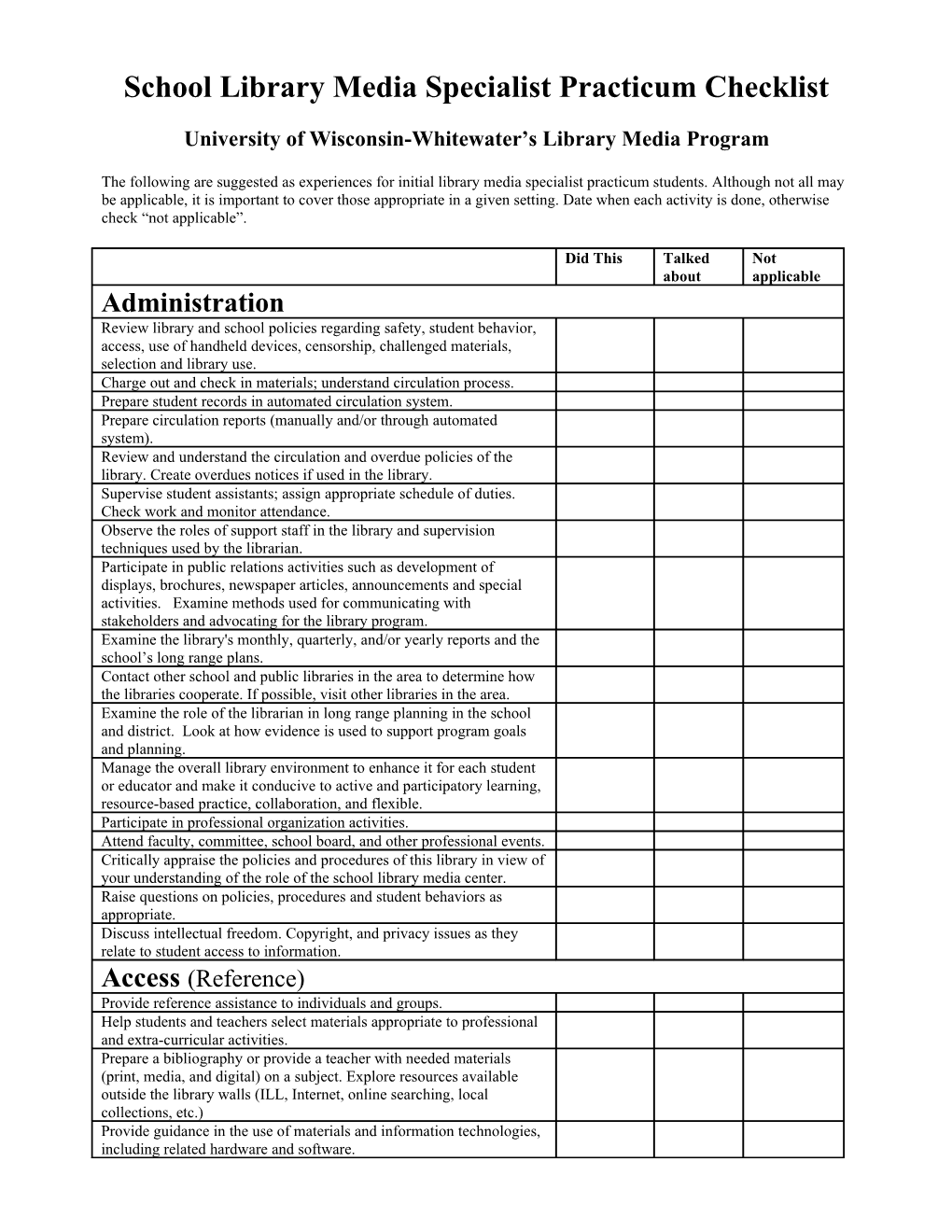School Library Media Specialist Practicum Checklist
University of Wisconsin-Whitewater’s Library Media Program
The following are suggested as experiences for initial library media specialist practicum students. Although not all may be applicable, it is important to cover those appropriate in a given setting. Date when each activity is done, otherwise check “not applicable”.
Did This / Talked about / Not applicableAdministration
Review library and school policies regarding safety, student behavior, access, use of handheld devices, censorship, challenged materials, selection and library use.Charge out and check in materials; understand circulation process.
Prepare student records in automated circulation system.
Prepare circulation reports (manually and/or through automated system).
Review and understand the circulation and overdue policies of the library. Create overdues notices if used in the library.
Supervise student assistants; assign appropriate schedule of duties. Check work and monitor attendance.
Observe the roles of support staff in the library and supervision techniques used by the librarian.
Participate in public relations activities such as development of displays, brochures, newspaper articles, announcements and special activities. Examine methods used for communicating with stakeholders and advocating for the library program.
Examine the library's monthly, quarterly, and/or yearly reports and the school’s long range plans.
Contact other school and public libraries in the area to determine how the libraries cooperate. If possible, visit other libraries in the area.
Examine the role of the librarian in long range planning in the school and district. Look at how evidence is used to support program goals and planning.
Manage the overall library environment to enhance it for each student or educator and make it conducive to active and participatory learning, resource-based practice, collaboration, and flexible.
Participate in professional organization activities.
Attend faculty, committee, school board, and other professional events.
Critically appraise the policies and procedures of this library in view of your understanding of the role of the school library media center.
Raise questions on policies, procedures and student behaviors as appropriate.
Discuss intellectual freedom. Copyright, and privacy issues as they relate to student access to information.
Access (Reference)
Provide reference assistance to individuals and groups.Help students and teachers select materials appropriate to professional and extra-curricular activities.
Prepare a bibliography or provide a teacher with needed materials (print, media, and digital) on a subject. Explore resources available outside the library walls (ILL, Internet, online searching, local collections, etc.)
Provide guidance in the use of materials and information technologies, including related hardware and software.
Instructional Leadership (Information Literacy, Literature)
Discuss how the librarian is involved in the curriculum development process at both the building and district level to ensure the inclusion of information, media, visual, digital and technological literacy in the curriculum. Examine how these skills are assessed in the school.Observe conferences with teachers and administrators on the library, its services and planning for integration into the curriculum.
Review and understand the library's policy on the scheduling of classes, groups and individuals.
Collaborate with a teacher to plan learning activities with integrated information seeking skills and use of appropriate technologies. Incorporate adaptations for individual differences in abilities, learning styles and interests.
Provide individual or group instruction in information seeking skills, use of technology, media production, and legal, ethical and social responsibility.
Participate in a program to motivate reading, listening, viewing and communication skills.
Identify student reading interests and provide guidance in selection of resources for leisure reading, reading for understanding and diversity of viewpoints and genres.
Assist with inservice and orientation activities for school staff.
Collection Management & Use (Cataloging, Collection Development)
Become familiar with the curriculum of the school through examination of curriculum guides and textbooks, discussions with teachers and staff, and observation of classes.Evaluate the collection and access to resources on a given topic.
Select materials (print, av, and online resources) on a given topic for a given level. Use standard selection sources.
Prepare book orders.
Examine licenses for digital resources. Explore any collaborative purchasing agreements in the district.
Check in and process new materials to prepare for shelving and circulation.
Prepare and enter records into the online catalog according to established cataloging practice.
Review and understand ordering of periodicals at the library.
Check in periodicals and prepare them for circulation.
Review and understand the acquisition procedures (authorizing orders and payments, maintaining records of expenditures).
Review the sources of funds for the library including the Common School Fund and the budget categories used by the district (WUFAR)
Use computer technology appropriate for school library media center operations.
Technology
Solve simple technology problems (hardware and software)Create a technology product for a specified need (e.g., handout, PowerPoint, brochure, video, webpage)
Examine new applications and technology tools for their use in teaching, learning, collaboration, and seeking, using and communicating information. Work with students and teachers using these technologies.
1/11
